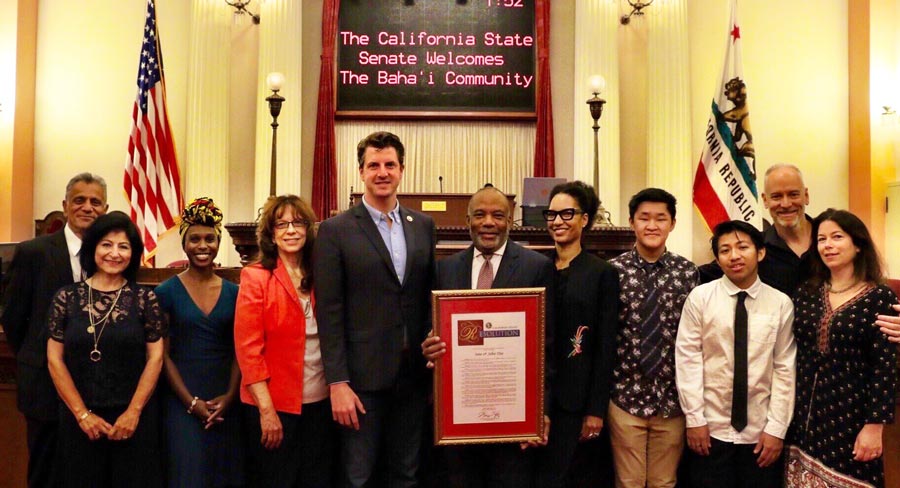In the annals of spiritual history, milestones are often celebrated not merely for their date but for the profound impact they have on entire communities. The bicentenary of the Baha’i Faith is a remarkable occasion, marked by various commemorative events, including significant acknowledgments by parliamentary figures. But what does this honor signify for the intermingling of political realms and spiritual aspirations? Is there a deeper challenge that arises from this intersection?
The Baha’i Faith, founded in the mid-19th century, has consistently emphasized the intrinsic connection between spirituality and societal advancement. This fundamental belief is poignantly reflected in the celebration of the bicentenary, as it was not just a reflection of the organization’s rich history but also a testament to the potential of unity and collaboration between diverse sectors of society. This occasion prompted a variety of gatherings, where members of Parliament publicly recognized the contributions of Baha’i communities. The involvement of these lawmakers illuminates the progressive ideals embedded within Baha’i teachings, which advocate for justice, equality, and peace.
The bicentenary celebrations were marked by various activities designed to reflect on the teachings of Baha’u’llah, the founder of the Baha’i Faith. These events served as a platform for enlightening discussions around the profound wisdom found in Baha’i scriptures, encouraging participants to delve deeper into the principles of tolerance, dialogue, and mutual respect. Critical to these discussions was the role of parliamentary recognition, which elevates the conversation from religion to a broader societal discourse about shared human values.
Furthermore, the attendance of parliamentary members is not merely symbolic; it serves to strengthen the dialogue between faith communities and governing bodies. This interaction encourages a holistic approach towards tackling issues such as discrimination, inequality, and the need for fostering inclusive societies. It invites a playful question: Can the secular realm truly encompass the depth of spiritual insights that guide communities like the Baha’is? Or does the presence of political figures dilute the essence of the spiritual celebration?
Yet, herein lies a potential challenge. While engagements between lawmakers and faith communities are beneficial, they can also reflect an imbalance. The Baha’i teachings advocate for the autonomy of spiritual matters, cautioning that governmental influence should not encroach upon religious principles. The risk becomes one of commodifying spiritual milestones for political gain rather than genuinely honoring the ethos of the celebrations. This challenge beckons communities to tread carefully.
Moreover, the positive outcomes of such recognition can serve to unify rather than divide. Celebrating the bicentenary with the presence of public officials can enhance visibility for the Baha’i narrative, fostering acceptance and understanding in a diverse societal landscape. The challenge, then, is nurturing this relationship without compromising essential tenets of faith. It compels Baha’is to engage with civic leaders while retaining their core principles, finding a harmonious balance between the spiritual and the political.
An integral part of this dialogue often revolves around the pursuit of social justice—an attribute deeply embedded in Baha’i teachings. The recognition by Parliament during the bicentenary could act as a catalyst, urging lawmakers to reflect on policies that align with the Baha’i commitment to equality and justice. How might this recognition transform legislation around social equity, rights, and civic engagement? This becomes a point of departure for Baha’i communities to advocate for meaningful reforms, urging policymakers to see the intersection of spirituality and governance as a pathway to a more equitable society.
As the bicentenary celebrations unfold, communities are called to engage in acts of service, reflection, and education. It is a moment rich with potential, where the age-old wisdom of Baha’u’llah resonates more powerfully than ever. Engaging beyond the confines of traditional gatherings, Baha’is are empowered to influence the public discourse by showcasing how spiritual principles can guide civic behaviors and decision-making processes.
The bicentenary also prompts an exploration into the future of Baha’i engagement with civic leaders. How will these connections evolve in the coming years? What new frameworks for collaboration can be constructed? These inquiries are essential as we move forward, cultivating pathways for interfaith dialogue and cooperation—essential elements for building a more cohesive and compassionate society.
Ultimately, the bicentenary is not merely an occasion to remember the past; it serves as a clarion call to action. It beckons individuals to reflect on their roles as catalysts for change. As Baha’is embrace the recognition bestowed upon their community by Members of Parliament, they must remain vigilant guardians of their spiritual principles. It is this delicate balance that will truly shape the narrative of the Baha’i Faith in contemporary society. Can the rich heritage of Baha’i teachings inspire lawmakers to foster a future grounded in justice, peace, and unity? Only time will illuminate the path ahead.
